英语所有从句大全
高中英语从句大全

高中英语从句大全1)表语从句1.定义:用作表语的从句叫做表语从句。
2.构成:关联词+简单句3.引导表语从句的关联词的种类:(1)从属连词that.如:The trouble is that I have lost his address.麻烦是我把他的地址丢了。
(2)从属连词whether,as,as if.如:He looked just as he had looked ten years before.他看起来还与十年前一样。
The question is whether they will be able to help us.问题是他们是否能帮我们。
注:从属连词if一般不用来引导表语从句,但as if却可引导表语从句,如: All this was over twenty years ago,but it’s as if it was only yesterday.这都是20多年前的事了,但宛如昨天一样。
能跟表语从句的谓语动词一般为系动词be,seem,look等。
如:It looked as if it was going to rain.看起来天要下雨了。
(3)连接代词who,whom,whose,what,which,whoever,whatever,whichever 连接副词 where,when,how,why.如:The problem is who we can get to replace her.问题是我们能找到谁去替换她呢。
The question is how he did it.问题是他是如何做此事的。
That was what she did this morning on reaching the attic.那就是她今晨上了阁楼干的。
解释:1.连词because可引导表语从句。
如:I think it is because you are doing too much.我想这是因为你做得太多。
英语所有从句类型举例
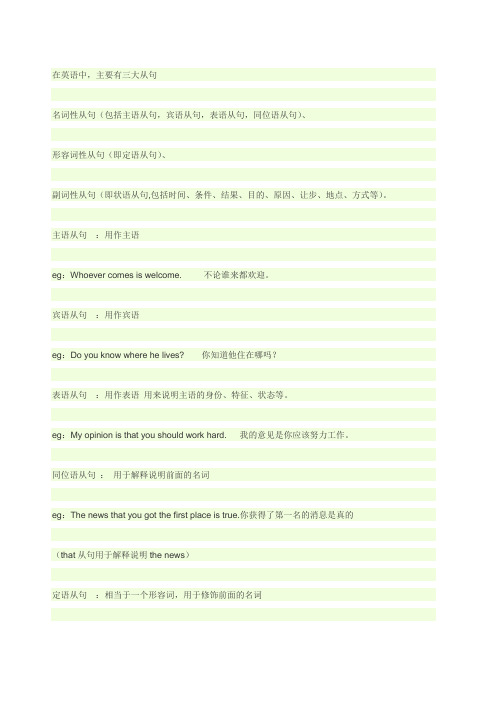
在英语中,主要有三大从句
名词性从句(包括主语从句,宾语从句,表语从句,同位语从句)、
形容词性从句(即定语从句)、
副词性从句(即状语从句,包括时间、条件、结果、目的、原因、让步、地点、方式等)。
主语从句:用作主语
eg:Whoever comes is welcome. 不论谁来都欢迎。
宾语从句:用作宾语
eg:Do you know where he lives? 你知道他住在哪吗?
表语从句:用作表语用来说明主语的身份、特征、状态等。
eg:My opinion is that you should work hard. 我的意见是你应该努力工作。
同位语从句:用于解释说明前面的名词
eg:The news that you got the first place is true.你获得了第一名的消息是真的
(that从句用于解释说明the news)
定语从句:相当于一个形容词,用于修饰前面的名词
eg:The student who answered the question was sandy. 回答问题的学生是sandy.
状语从句:相当于一个副词
eg:When it rains, I usually go to school by bus. 天下雨时,我通常坐公共汽车上学。
(时间状语)If he comes tomorrow, you will see him. 如果他明天来,你就可以看到他了。
(条件状语)
(if 引导的条件状语从句,其结构为:if +状语从句,+主句)。
要注意在状语从句中有一个规则是“主将从现”,即主句是将来时,则从句要用一般现在时表示将来。
(完整版)英语所有从句大全
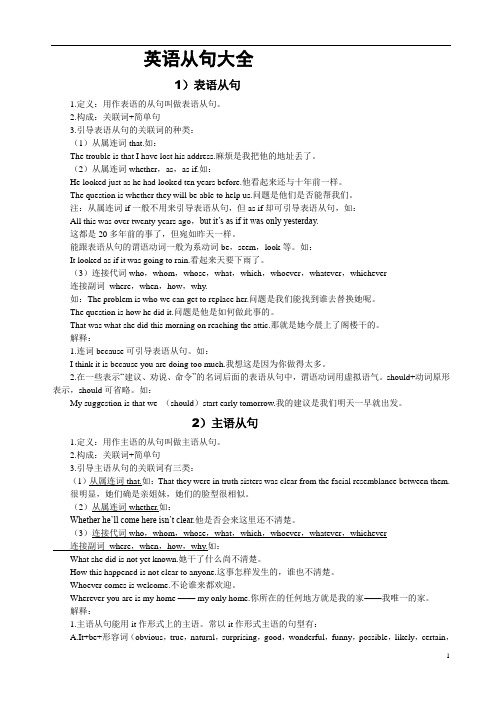
英语从句大全1)表语从句1.定义:用作表语的从句叫做表语从句。
2.构成:关联词+简单句3.引导表语从句的关联词的种类:(1)从属连词that.如:The trouble is that I have lost his address.麻烦是我把他的地址丢了。
(2)从属连词whether,as,as if.如:He looked just as he had looked ten years before.他看起来还与十年前一样。
The question is whether they will be able to help us.问题是他们是否能帮我们。
注:从属连词if一般不用来引导表语从句,但as if却可引导表语从句,如:All this was over twenty years ago,but it’s as if it was only yesterday.这都是20多年前的事了,但宛如昨天一样。
能跟表语从句的谓语动词一般为系动词be,seem,look等。
如:It looked as if it was going to rain.看起来天要下雨了。
(3)连接代词who,whom,whose,what,which,whoever,whatever,whichever连接副词where,when,how,why.如:The problem is who we can get to replace her.问题是我们能找到谁去替换她呢。
The question is how he did it.问题是他是如何做此事的。
That was what she did this morning on reaching the attic.那就是她今晨上了阁楼干的。
解释:1.连词because可引导表语从句。
如:I think it is because you are doing too much.我想这是因为你做得太多。
分钟搞懂英语中的各种从句
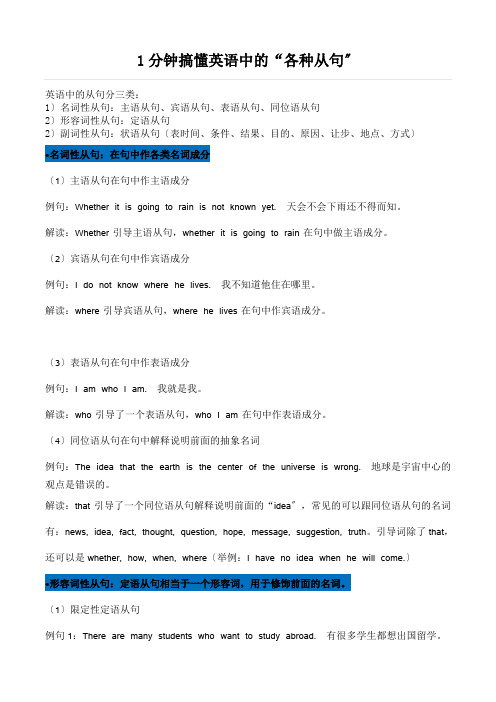
1分钟搞懂英语中的“各种从句〞英语中的从句分三类:1〕名词性从句:主语从句、宾语从句、表语从句、同位语从句2〕形容词性从句:定语从句2〕副词性从句:状语从句〔表时间、条件、结果、目的、原因、让步、地点、方式〕*名词性从句:在句中作各类名词成分〔1〕主语从句在句中作主语成分例句:Whether it is going to rain is not known yet. 天会不会下雨还不得而知。
解读:Whether引导主语从句,whether it is going to rain在句中做主语成分。
〔2〕宾语从句在句中作宾语成分例句:I do not know where he lives. 我不知道他住在哪里。
解读:where引导宾语从句,where he lives在句中作宾语成分。
〔3〕表语从句在句中作表语成分例句:I am who I am. 我就是我。
解读:who引导了一个表语从句,who I am在句中作表语成分。
〔4〕同位语从句在句中解释说明前面的抽象名词例句:The idea that the earth is the center of the universe is wrong. 地球是宇宙中心的观点是错误的。
解读:that引导了一个同位语从句解释说明前面的“idea〞,常见的可以跟同位语从句的名词有:news, idea, fact, thought, question, hope, message, suggestion, truth。
引导词除了that,还可以是whether, how, when, where〔举例:I have no idea when he will come.〕*形容词性从句:定语从句相当于一个形容词,用于修饰前面的名词。
〔1〕限定性定语从句例句1:There are many students who want to study abroad. 有很多学生都想出国留学。
英语中8种从句介绍-锐
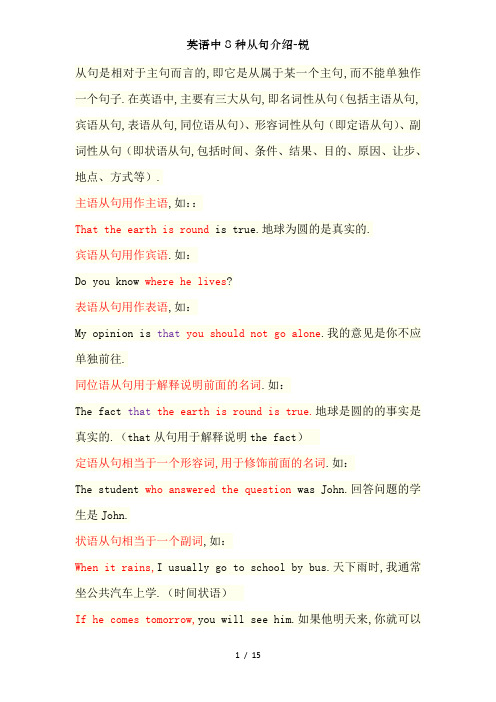
从句是相对于主句而言的,即它是从属于某一个主句,而不能单独作一个句子.在英语中,主要有三大从句,即名词性从句(包括主语从句,宾语从句,表语从句,同位语从句)、形容词性从句(即定语从句)、副词性从句(即状语从句,包括时间、条件、结果、目的、原因、让步、地点、方式等).主语从句用作主语,如::That the earth is round is true.地球为圆的是真实的.宾语从句用作宾语.如:Do you know where he lives?表语从句用作表语,如:My opinion is that you should not go alone.我的意见是你不应单独前往.同位语从句用于解释说明前面的名词.如:The fact that the earth is round is true.地球是圆的的事实是真实的.(that从句用于解释说明the fact)定语从句相当于一个形容词,用于修饰前面的名词.如:The student who answered the question was John.回答问题的学生是John.状语从句相当于一个副词,如:When it rains,I usually go to school by bus.天下雨时,我通常坐公共汽车上学.(时间状语)If he comes tomorrow,you will see him.如果他明天来,你就可以看见他.(if 引导的条件状语从句,其结构为:if +状语从句,+主句).要注意在状语从句中有一个规则是“主将从现”,即主句是将来时,则从句要用一般现在时表示将来.主句和从句的划分方法是相同的.句子的成分从谓语动词处来划分比较容易.谓语动词前面的部分是主语,后面常接宾语,修饰谓语动词的是状语,修饰主语、宾语的是定语,若谓语是系动词,则系动词后的部分是表语.如:I am a teacher.其中,I 是主语,am是谓语,a teacher 是表语.He likes playing football very mucy.其中,he是主语,likes是谓语,playing football是宾语,very much是状语.英语中8种从句介绍1定语从句2时间状语从句3地点状语从句4条件状语从句5同位语从句6表语从句7宾语从句8主语从句名词性从句:在句子中起名词作用的句子叫名词从句(Noun Clauses).名词从句的功能相当于名词词组,它在复合句中能担任主语、宾语、表语、同位语、介词宾语等,因此根据它在句中不同的语法功能,名词从句又可分别称为主语从句、宾语从句、表语从句和同位语从句.引导名词性从句的连接词引导名词性从句的连接词可分为三类:连接词:that,whether,if 不充当从句的任何成分)连接代词:what,whatever,who,whoever,whom,whose,which.连接副词:when,where,how,why不可省略的连词:1.介词后的连词2.引导主语从句和同位语从句的连词不可省略.That she was chosen made us very happy.We heard the news that our team had won.比较:whether与if 均为"是否"的意思.但在下列情况下,whether 不能被if 取代:1.whether引导主语从句并在句首2.引导表语从句3.whether从句作介词宾语4.从句后有"or not"Whether he will come is not clear.大部分连接词引导的主语从句都可以置于句末,用 it充当形式主语. It is not important who will go.It is still unknown which team will win the match.)由从属连词that引导的从句叫做名词性that-从句.That只起连接主句和从句的作用,在从句中不担任任何成分,本身也没有词义.名词性that-从句在句中能充当主语、宾语、表语、同位语和形容词宾语,例如:主语:That he is still alive is sheer luck.他还活着全靠运气. 宾语:John said that he was leaving for London on Wednesday.约翰说他星期三要到伦敦去.表语:The fact is that he has not been seen recently.事实是近来谁也没有见过他.同位语:The fact that he has not been seen recently disturbs everyone in his office.近来谁也没有见过他,这一事实令办公室所有的人不安.形容词宾语:I am glad that you are satisfied with your job. 你对工作满意我感到很高兴.2)That- 从句作主语通常用it作先行词,而将that-从句置于句末,例如:It is quite clear that the whole project is doomed to failure.很清楚,整个计划注定要失败.It's a pity that you should have to leave.你非走不可真是件憾事一、什么是英语从句?要回答这个问题,先要弄清楚两个小问题:1、什么叫英语的句子一般情况下,英语句子中必定有一个主语和谓语,或者说,有主语和谓语组成的句子就是句子.例如:Mr. Wang teaches English in a middle school.Many trees were planted last spring.2、英语句子的成份英语的句子中,不仅只有主语和谓语,还有其它的句子成份,其中最主要的成份有:主语、谓语、宾语、状语、定语等.这几种成份在句子的位置大致是:(状语) + (定语)主语(定语) + (状语)谓语(状语) + (定语)宾语(宾语补足语) + (状语)也就是,定语一般位于主语和宾语的前后;状语一般位于谓语的前后;及物动词后一般接宾语和宾语补足语.有一点请注意:英语句子中状语的位置非常灵活,它在句首、句中、句末都可以.3、什么是英语的从句在明白了英语句子的成份之后,再来讨论英语从句就比较简单了.因为,什么叫从句呢?就是英语句中的某一成份不是一个单词或词组,而是一个句子,那么这个担任成份的句子就叫从句.如果定语是一个句子,它就叫定语从句;如果宾语是一个句子,它就是宾语从句.依此类推.例如:The boy and the dog [that are in the picture ]are very lovely. (括号中that开始的句子就是定语从句)We revisited the village [where we had worked before.] (括号中where引导的句子也是定语从句)He learned [that this was a hard work (which must be finished in a week.)] (这句里有两个从句,方括号由that引导的是宾语从句;在这个宾语从句中又包含了一个由which引导的定语从句.)因此,对于一个比较复杂的较长的英语句子来说,它就可能存在几个句子,即主句和担任各种成份的从句.从这个角度看,也可以说从句是句子中的句子.二、定语从句(Attributive Clauses)在句中做定语,修饰一个名词或代词,被修饰的名词,词组或代词即先行词.定语从句通常出现在先行词之后,由关系词(关系代词或关系副词)引出.关系代词有:who, whom, whose, that, which等.关系副词有:when, where, why等. 18.1 关系代词引导的定语从句关系代词所代替的先行词是人或物的名词或代词,并在句中充当主语、宾语、定语等成分.关系代词在定语从句中作主语时,从句谓语动词的人称和数要和先行词保持一致.1)who, whom, that这些词代替的先行词是人的名词或代词,在从句中所起作用如下:Is he the man who/that wants to see you?他就是你想见的人吗?(who/that在从句中作主语)He is the man whom/ that I saw yesterday.他就是我昨天见的那个人.(whom/that在从句中作宾语)2) Whose 用来指人或物,(只用作定语, 若指物,它还可以同of which 互换), 例如:They rushed over to help the man whose car had broken down. 那人车坏了,大家都跑过去帮忙.Please pass me the book whose (of which) cover is green. 请递给我那本绿皮的书.3)which, that它们所代替的先行词是事物的名词或代词,在从句中可作主语、宾语等,例如:A prosperity which / that had never been seen before appears in the countryside. 农村出现了前所未有的繁荣.(which / that 在句中作宾语)The package (which / that) you are carrying is about to come unwrapped. 你拿的包快散了.(which / that在句中作宾语 18.2 关系副词引导的定语从句关系副词可代替的先行词是时间、地点或理由的名词,在从句中作状语.1)when, where, why关系副词when, where, why的含义相当于"介词+ which"结构,因此常常和"介词+ which"结构交替使用,例如:There are occasions when (on which) one must yield. 任何人都有不得不屈服的时候.Beijing is the place where (in which) I was born. 北京是我的出生地.Is this the reason why (for which) he refused our offer? 这就是他拒绝我们帮助他的理由吗?2)that代替关系副词that可以用于表示时间、地点、方式、理由的名词后取代when, where, why和"介词+ which"引导的定语从句,在口语中that常被省略,例如:His father died the year (that / when / in which) he was born. 他父亲在他出生那年逝世了.He is unlikely to find the place (that / where / in which) he lived forty years ago. 他不大可能找到他四十年前居住过的地方.用关系代词,还是关系副词完全取决于从句中的谓语动词.及物动词后面无宾语,就必须要求用关系代词;而不及物动词则要求用关系副词.例如:This is the mountain village where I stayed last year.I'll never forget the days when I worked together with you.判断改错(注:先显示题,再显示答案,横线;用不同的颜色表示出.)(错) This is the mountain village where I visited last year. (错)I will never forget the days when I spent in the countryside.(对) This is the mountain village (which) I visited last year.(对)I'll never forget the days (which) I spent in the countryside.习惯上总把表地点或时间的名词与关系副词 where, when联系在一起.此两题错在关系词的误用上.内容提要定语从句是由关系代词和关系副词引导的从句,其作用是作定语修饰主句的某个成分,定语从句分为限定性和非限定性从句两种.状语从句分为时间状语从句,结果状语从句,让步状语从句,原因状语从句,条件状语从句以及行为方式状语从句.名词从句包括主语从句,宾语从句,表语从句和同位语从句及there be句型.一、限定性定语从句1. that即可代表事物也可代表人,which代表事物;它们在从句中作主语或宾语,that在从句中作宾语时常可省略关系词,which在从句中作宾语则不能省略.而且,如果which在从句中作“不及物动词+介词”的介词的宾语,注意介词不要丢掉,而且介词总是放在关系代词which的前边,但有的则放在它原来的位置2. which作宾语时,根据先行词与定语从句之间的语义关系,先行词与which之间的介词不能丢3. 代表物时多用which,但在带有下列词的句子中用that而不用which,这些词包括all, anything, much等,这时的that常被省略4. who和whom引导的从句用来修饰人,分别作从句中的主语和宾语,whom作宾语时,要注意它可以作动词的宾语也可以作介词的宾语5. where是关系副词,用来表示地点的定语从句6. when引导定语从句表示时间〔注〕值得一提的是,表示时间“time"一词的定语从句只用when引导,有时不用任何关系代词,当然也不用that引导By the time you arrive in London, we will have stayed there for two weeks.I still remember the first time I met her.Each time he goes to besiness trip, he brings a lot of living necessities, such as towers, soap, toothbrush etc.7. whose是关系代词,修饰名词作定语,相当于所修饰成分的前置所有格8. 当从句的逻辑主语是some, any, no, somebody, anybody, nobody, something, anything, everything或nothing时,常用there is来引导二、非限定性定语从句:非限定性定语从句的作用是对所修饰的成分作进一步说明,通常和主句间用逗号隔开,将从句拿掉后其他部分仍可成立1. which引导的非限定性定语从句来说明前面整个句子的情况或主句的某一部分2. 在引导限定性定语从句时,that有时相当于in which, at which, for which或at whichAttitudes towards daydreaming are changing in much the same way that(in which) attitudes towards night dreaming have changed. 人们对白日做梦的态度正在改变,这与人们对夜间做梦的看法的变化有非常相似之处.I like the music for the very reason that(for which) he dislike it. 我出于某种原因喜欢这种音乐,而他恰恰与我相反.We arrived the day that(on which) they left. 刚好我们到的那天他们走了.3. 有时as也可用作关系代词4. 在非限定性定语从句中,不能用that,而用who, whom代表人,用which代表事物先行词:是在定语从句中,被定语从句所修饰的名词.例如:He is a teacher who teach our English.在这里定词从句who teach our English是来修饰前面的名词teacher.所以teacher就是一个先行词.再说下它的用法:1、先行词指人时,引导词可用Who,Whom,及that,其中当引导词在句中作主语时用Who或that;当其充当宾语时用whom或that,在非正式宾语中也可用who,也可省略.a That boy who/that broke the window is called Tom.b The person to whom you just talked is Mr Li.b 句可改为:The person(that/whom/who)you just talked to is Mr Li.2、先行词指物时,引导词用that或whicha.They planted the trees which didn’t need much water.b .The fish (which)we bought were not fresh.3、先行词指时间时,引导词用When/on which或in whicha.I still remember the day when/on which I first came to Bei jing.b.I'll never forget the year when/ on which we worked on the farm.4、先行词指地点时,引导词用Where或in whichThis is the house where/in which we lived last year.或:This is the house that/which we lived in last year.5、whose在定语从句中作定语时,可用来指人,也可以用来指物,如:a.This is the boy whose mother died a month ago.b.This is the house whose windows were broken.此句可改成:This is the house the windoues of which were broken.6、先行词表示原因时,引导词用why,如:The reason why he was late for school was that he had been knocked down by a bike.二、物殊情况:尽管有以上基本原则,但要学好定语从句更应注意以下特殊情况;Ⅰ、当定语从句的先行词为表示人的不定代词,如anyone,anybody,everyone,everybody,noone,nobody,all,these ,those等时,用who而不用thatThose who break the rule are pulished.Anybody who had eyes could see the elephant was like a snake. Ⅱ.以who或which作主语的特殊疑问句中先行词指人,引导词只用That,如:a.Who is the person that is standing at the gate ?b.Which of you that knows something about English doesn’t know this word?Ⅲ、先行词指物时引导词用that而不用which的情况:1、先行词有序数词或形容词最高级修饰时,This is the best composition that has been written in English.2、先行词是all,something,anything,nothing,everything,little,few,much等不定代词时There is nothing/little/much that we can do for her.3、先行词被all,every,no,some,any,little,much等修饰时I’ve read all the books that you gave me.4、先行词被the only/very等修饰时This is the very/last place that they visited yesterday. 5、有两个以上先行词,分别表示人或物时They talked about the teachers and the schools that they had visited.6、先行词为基数时Yesterday I caught two fish,Now you can see the two that are still alive in a basin of water.Ⅳ.time为先行词时,前边如有序数词修饰时,定语从句引导词用that或什么也不用,如没序数词修饰时,用when或that均可a.This is the last time(that)I shall give you a lesson.先行词指人时,引导词可用Who,Whom,及that,其中当引导词在句中作主语时用Who或that;当其充当宾语时用whom或that,在非正式宾语中也可用who,也可省略.a That boy who/that broke the window is called Tom.b The person to whom you just talked is Mr Li.b 句可改为:The person(that/whom/who)you just talked to is Mr Li.2、先行词指物时,引导词用that或whicha.They planted the trees which didn’t need much water.b .The fish (which)we bought were not fresh.3、先行词指时间时,引导词用When/on which或in whicha.I still remember the day when/on which I first came to Bei jing.b.I'll never forget the year when/ on which we worked on the farm.4、先行词指地点时,引导词用Where或in whichThis is the house where/in which we lived last year.或:This is the house that/which we lived in last year.5、whose在定语从句中作定语时,可用来指人,也可以用来指物,如:a.This is the boy whose mother died a month ago.b.This is the house whose windows were broken.此句可改成:This is the house the windoues of which were broken.6、先行词表示原因时,引导词用why,如:The reason why he was late for school was that he had been knocked down by a bike.。
英语中8种从句介绍-锐
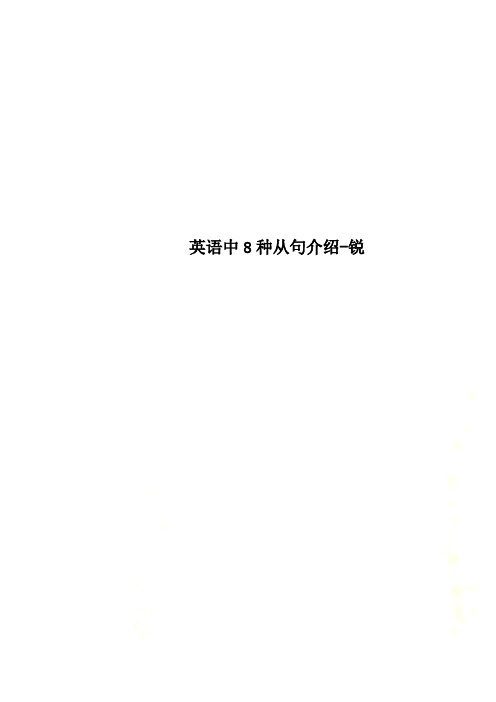
英语中8种从句介绍-锐从句是相对于主句而言的,即它是从属于某一个主句,而不能单独作一个句子.在英语中,主要有三大从句,即名词性从句(包括主语从句,宾语从句,表语从句,同位语从句)、形容词性从句(即定语从句)、副词性从句(即状语从句,包括时间、条件、结果、目的、原因、让步、地点、方式等).主语从句用作主语,如::That the earth is round is true.地球为圆的是真实的.宾语从句用作宾语.如:Do you know where he lives?表语从句用作表语,如:My opinion is that you should not go alone.我的意见是你不应单独前往.同位语从句用于解释说明前面的名词.如:The fact that the earth is round is true.地球是圆的的事实是真实的.(that从句用于解释说明the fact)定语从句相当于一个形容词,用于修饰前面的名词.如:The student who answered the question was John.回答问题的学生是John.状语从句相当于一个副词,如:When it rains,I usually go to school by bus.天下雨时,我通常坐公共汽车上学.(时间状语)If he comes tomorrow,you will see him.如果他明天来,你就可以看见他.(if 引导的条件状语从句,其结构为:if +状语从句,+主句).要注意在状语从句中有一个规则是“主将从现”,即主句是将来时,则从句要用一般现在时表示将来.主句和从句的划分方法是相同的.句子的成分从谓语动词处来划分比较容易.谓语动词前面的部分是主语,后面常接宾语,修饰谓语动词的是状语,修饰主语、宾语的是定语,若谓语是系动词,则系动词后的部分是表语.如:I am a teacher.其中,I 是主语,am是谓语,a teacher 是表语.He likes playing football very mucy.其中,he是主语,likes是谓语,playing football是宾语,very much是状语.英语中8种从句介绍1定语从句2时间状语从句3地点状语从句4条件状语从句5同位语从句6表语从句7宾语从句8主语从句名词性从句:在句子中起名词作用的句子叫名词从句(Noun Clauses).名词从句的功能相当于名词词组,它在复合句中能担任主语、宾语、表语、同位语、介词宾语等,因此根据它在句中不同的语法功能,名词从句又可分别称为主语从句、宾语从句、表语从句和同位语从句.引导名词性从句的连接词引导名词性从句的连接词可分为三类:连接词:that,whether,if 不充当从句的任何成分)连接代词:what,whatever,who,whoever,whom,whose,which.连接副词:when,where,how,why不可省略的连词:1.介词后的连词2.引导主语从句和同位语从句的连词不可省略.That she was chosen made us very happy.We heard the news that our team had won.比较:whether与if 均为"是否"的意思.但在下列情况下,whether 不能被if 取代:1.whether引导主语从句并在句首2.引导表语从句3.whether从句作介词宾语4.从句后有"or not"Whether he will come is not clear.大部分连接词引导的主语从句都可以置于句末,用 it充当形式主语.It is not important who will go.It is still unknown which team will win the match.)由从属连词that引导的从句叫做名词性that-从句.That只起连接主句和从句的作用,在从句中不担任任何成分,本身也没有词义.名词性that-从句在句中能充当主语、宾语、表语、同位语和形容词宾语,例如:主语:That he is still alive is sheer luck.他还活着全靠运气. 宾语:John said that he was leaving for London on Wednesday.约翰说他星期三要到伦敦去.表语:The fact is that he has not been seen recently.事实是近来谁也没有见过他.同位语:The fact that he has not been seen recently disturbs everyone in his office.近来谁也没有见过他,这一事实令办公室所有的人不安.形容词宾语:I am glad that you are satisfied with your job. 你对工作满意我感到很高兴.2)That- 从句作主语通常用it作先行词,而将that-从句置于句末,例如:It is quite clear that the whole project is doomed to failure.很清楚,整个计划注定要失败.It's a pity that you should have to leave.你非走不可真是件憾事一、什么是英语从句?要回答这个问题,先要弄清楚两个小问题:1、什么叫英语的句子一般情况下,英语句子中必定有一个主语和谓语,或者说,有主语和谓语组成的句子就是句子.例如:Mr. Wang teaches English in a middle school.Many trees were planted last spring.2、英语句子的成份英语的句子中,不仅只有主语和谓语,还有其它的句子成份,其中最主要的成份有:主语、谓语、宾语、状语、定语等.这几种成份在句子的位置大致是:(状语) + (定语)主语(定语) + (状语)谓语(状语) + (定语)宾语(宾语补足语) + (状语)也就是,定语一般位于主语和宾语的前后;状语一般位于谓语的前后;及物动词后一般接宾语和宾语补足语.有一点请注意:英语句子中状语的位置非常灵活,它在句首、句中、句末都可以.3、什么是英语的从句在明白了英语句子的成份之后,再来讨论英语从句就比较简单了.因为,什么叫从句呢?就是英语句中的某一成份不是一个单词或词组,而是一个句子,那么这个担任成份的句子就叫从句.如果定语是一个句子,它就叫定语从句;如果宾语是一个句子,它就是宾语从句.依此类推.例如:The boy and the dog [that are in the picture ]are very lovely. (括号中that开始的句子就是定语从句)We revisited the village [where we had worked before.] (括号中where引导的句子也是定语从句)He learned [that this was a hard work (which must be finished in a week.)] (这句里有两个从句,方括号由that引导的是宾语从句;在这个宾语从句中又包含了一个由which引导的定语从句.)因此,对于一个比较复杂的较长的英语句子来说,它就可能存在几个句子,即主句和担任各种成份的从句.从这个角度看,也可以说从句是句子中的句子.二、定语从句(Attributive Clauses)在句中做定语,修饰一个名词或代词,被修饰的名词,词组或代词即先行词.定语从句通常出现在先行词之后,由关系词(关系代词或关系副词)引出.关系代词有:who, whom, whose, that, which等.关系副词有:when, where, why等. 18.1 关系代词引导的定语从句关系代词所代替的先行词是人或物的名词或代词,并在句中充当主语、宾语、定语等成分.关系代词在定语从句中作主语时,从句谓语动词的人称和数要和先行词保持一致.1)who, whom, that这些词代替的先行词是人的名词或代词,在从句中所起作用如下:Is he the man who/that wants to see you?他就是你想见的人吗?(who/that在从句中作主语)He is the man whom/ that I saw yesterday.他就是我昨天见的那个人.(whom/that在从句中作宾语)2) Whose 用来指人或物,(只用作定语, 若指物,它还可以同of which互换), 例如:They rushed over to help the man whose car had broken down. 那人车坏了,大家都跑过去帮忙.Please pass me the book whose (of which) cover is green. 请递给我那本绿皮的书.3)which, that它们所代替的先行词是事物的名词或代词,在从句中可作主语、宾语等,例如:A prosperity which / that had never been seen before appears in the countryside. 农村出现了前所未有的繁荣.(which / that 在句中作宾语)The package (which / that) you are carrying is about to come unwrapped. 你拿的包快散了.(which / that在句中作宾语 18.2 关系副词引导的定语从句关系副词可代替的先行词是时间、地点或理由的名词,在从句中作状语.1)when, where, why关系副词when, where, why的含义相当于"介词+ which"结构,因此常常和"介词+ which"结构交替使用,例如:There are occasions when (on which) one must yield. 任何人都有不得不屈服的时候.Beijing is the place where (in which) I was born. 北京是我的出生地.Is this the reason why (for which) he refused our offer? 这就是他拒绝我们帮助他的理由吗?2)that代替关系副词that可以用于表示时间、地点、方式、理由的名词后取代when, where, why和"介词+ which"引导的定语从句,在口语中that常被省略,例如:His father died the year (that / when / in which) he was born. 他父亲在他出生那年逝世了.He is unlikely to find the place (that / where / in which) he lived forty years ago. 他不大可能找到他四十年前居住过的地方.用关系代词,还是关系副词完全取决于从句中的谓语动词.及物动词后面无宾语,就必须要求用关系代词;而不及物动词则要求用关系副词.例如:This is the mountain village where I stayed last year.I'll never forget the days when I worked together with you. 判断改错(注:先显示题,再显示答案,横线;用不同的颜色表示出.)(错) This is the mountain village where I visited last year. (错)I will never forget the days when I spent in the countryside.(对) This is the mountain village (which) I visited last year.(对) I'll never forget the days (which) I spent in the countryside.习惯上总把表地点或时间的名词与关系副词 where, when联系在一起.此两题错在关系词的误用上.内容提要定语从句是由关系代词和关系副词引导的从句,其作用是作定语修饰主句的某个成分,定语从句分为限定性和非限定性从句两种.状语从句分为时间状语从句,结果状语从句,让步状语从句,原因状语从句,条件状语从句以及行为方式状语从句.名词从句包括主语从句,宾语从句,表语从句和同位语从句及there be句型.一、限定性定语从句1. that即可代表事物也可代表人,which代表事物;它们在从句中作主语或宾语,that在从句中作宾语时常可省略关系词,which在从句中作宾语则不能省略.而且,如果which在从句中作“不及物动词+介词”的介词的宾语,注意介词不要丢掉,而且介词总是放在关系代词which的前边,但有的则放在它原来的位置2. which作宾语时,根据先行词与定语从句之间的语义关系,先行词与which之间的介词不能丢3. 代表物时多用which,但在带有下列词的句子中用that而不用which,这些词包括all, anything, much等,这时的that常被省略4. who和whom引导的从句用来修饰人,分别作从句中的主语和宾语,whom作宾语时,要注意它可以作动词的宾语也可以作介词的宾语5. where是关系副词,用来表示地点的定语从句6. when引导定语从句表示时间〔注〕值得一提的是,表示时间“time"一词的定语从句只用when引导,有时不用任何关系代词,当然也不用that引导By the time you arrive in London, we will have stayed there for two weeks.I still remember the first time I met her.Each time he goes to besiness trip, he brings a lot of living necessities, such as towers, soap, toothbrush etc.7. whose是关系代词,修饰名词作定语,相当于所修饰成分的前置所有格8. 当从句的逻辑主语是some, any, no, somebody, anybody, nobody, something, anything, everything或nothing时,常用there is来引导二、非限定性定语从句:非限定性定语从句的作用是对所修饰的成分作进一步说明,通常和主句间用逗号隔开,将从句拿掉后其他部分仍可成立1. which引导的非限定性定语从句来说明前面整个句子的情况或主句的某一部分2. 在引导限定性定语从句时,that有时相当于in which, at which, for which或at whichAttitudes towards daydreaming are changing in much the same way that(in which) attitudes towards night dreaming have changed. 人们对白日做梦的态度正在改变,这与人们对夜间做梦的看法的变化有非常相似之处.I like the music for the very reason that(for which) he dislike it. 我出于某种原因喜欢这种音乐,而他恰恰与我相反.We arrived the day that(on which) they left. 刚好我们到的那天他们走了.3. 有时as也可用作关系代词4. 在非限定性定语从句中,不能用that,而用who, whom代表人,用which代表事物先行词:是在定语从句中,被定语从句所修饰的名词.例如:He is a teacher who teach our English.在这里定词从句who teach our English是来修饰前面的名词teacher.所以teacher就是一个先行词.再说下它的用法:1、先行词指人时,引导词可用Who,Whom,及that,其中当引导词在句中作主语时用Who或that;当其充当宾语时用whom或that,在非正式宾语中也可用who,也可省略.a That boy who/that broke the window is called Tom.b The person to whom you just talked is Mr Li.b 句可改为:The person(that/whom/who)you just talked to is Mr Li.2、先行词指物时,引导词用that或whicha.They planted the trees which didn’t need much water.b .The fish (which)we bought were not fresh.3、先行词指时间时,引导词用When/on which或in whicha.I still remember the day when/on which I first came to Bei jing.b.I'll never forget the year when/ on which we worked on the farm.4、先行词指地点时,引导词用Where或in whichThis is the house where/in which we lived last year.或:This is the house that/which we lived in last year.5、whose在定语从句中作定语时,可用来指人,也可以用来指物,如:a.This is the boy whose mother died a month ago.b.This is the house whose windows were broken.此句可改成:This is the house the windoues of which were broken.6、先行词表示原因时,引导词用why,如:The reason why he was late for school was that he had been knocked down by a bike.二、物殊情况:尽管有以上基本原则,但要学好定语从句更应注意以下特殊情况;Ⅰ、当定语从句的先行词为表示人的不定代词,如anyone,anybody,everyone,everybody,noone,nobody,all,these ,those等时,用who而不用thatThose who break the rule are pulished.Anybody who had eyes could see the elephant was like a snake. Ⅱ.以who或which作主语的特殊疑问句中先行词指人,引导词只用That,如:a.Who is the person that is standing at the gate ?b.Which of you that knows something about English doesn’t know this word?Ⅲ、先行词指物时引导词用that而不用which的情况:1、先行词有序数词或形容词最高级修饰时,This is the best composition that has been written in English.2、先行词是all,something,anything,nothing,everything,little,few,much等不定代词时There is nothing/little/much that we can do for her.3、先行词被all,every,no,some,any,little,much等修饰时I’ve read all the books that you gave me.4、先行词被the only/very等修饰时This is the very/last place that they visited yesterday. 5、有两个以上先行词,分别表示人或物时They talked about the teachers and the schools that they had visited.6、先行词为基数时Yesterday I caught two fish,Now you can see the two that are still alive in a basin of water.Ⅳ.time为先行词时,前边如有序数词修饰时,定语从句引导词用that或什么也不用,如没序数词修饰时,用when或that均可a.This is the last time(that)I shall give you a lesson.先行词指人时,引导词可用Who,Whom,及that,其中当引导词在句中作主语时用Who或that;当其充当宾语时用whom或that,在非正式宾语中也可用who,也可省略.a That boy who/that broke the window is called Tom.b The person to whom you just talked is Mr Li.b 句可改为:The person(that/whom/who)you just talked to is MrLi.2、先行词指物时,引导词用that或whicha.They planted the trees which didn’t need much water.b .The fish (which)we bought were not fresh.3、先行词指时间时,引导词用When/on which或in whicha.I still remember the day when/on which I first came to Bei jing.b.I'll never forget the year when/ on which we worked on the farm.4、先行词指地点时,引导词用Where或in whichThis is the house where/in which we lived last year.或:This is the house that/which we lived in last year.5、whose在定语从句中作定语时,可用来指人,也可以用来指物,如:a.This is the boy whose mother died a month ago.b.This is the house whose windows were broken.此句可改成:This is the house the windoues of which were broken.6、先行词表示原因时,引导词用why,如:The reason why he was late for school was that he had been knocked down by a bike.。
高考从句所有知识点

高考从句所有知识点在语法学中,从句是一个重要的概念,也是高考英语考试中的必考内容。
了解并熟练运用从句的知识点将有助于我们在考试中取得更好的成绩。
本文将介绍高考英语考试中常见的从句类型以及相关的知识点。
1. 名词性从句名词性从句可以在一个句子中充当主语、宾语、表语或补足语等,并且引导词有:that、whether、who、whom、what、which、whoever、whomever、whatever、whichever等。
例如:- We all know that honesty is the best policy.(主语从句)- He asked me whether I would go with him.(宾语从句)- My question is who will take care of the plants when I'm away.(表语从句)- It is important that you come to the meeting tomorrow.(主语从句)2. 定语从句定语从句用来修饰一个名词或代词,一般由关系代词who、whom、whose、which、that或关系副词when、where、why引导。
例如:- The girl who is playing the piano is my sister.(修饰名词)- The book that you borrowed from me is on the desk.(修饰名词)- I still remember the day when we first met.(修饰名词)- The reason why he didn't come to the party is still unknown.(修饰名词)3. 状语从句状语从句用来修饰一个动词、形容词或副词,并且主要由连词引导,包括时间状语从句、条件状语从句、原因状语从句、结果状语从句等等。
英语八大从句类型总结

英语八大从句类型总结主句和从句的划分方法是相同的。
句子的成分从谓语动词处来划分比较容易。
今天我们就一起来看看吧!从句是相对于主句而言的,即它是从属于某一个主句,而不能单独作一个句子。
在英语中,主要有三大从句,即名词性从句包括主语从句,宾语从句,表语从句,同位语从句、形容词性从句即定语从句、副词性从句即状语从句,包括时间、条件、结果、目从句是相对于主句而言的,即它是从属于某一个主句,而不能单独作一个句子。
在英语中,主要有三大从句,即名词性从句包括主语从句,宾语从句,表语从句,同位语从句、形容词性从句即定语从句、副词性从句即状语从句,包括时间、条件、结果、目的、原因、让步、地点、方式等。
主语从句用作主语,如::That the earth is round is true. 地球为圆的是真实的。
宾语从句用作宾语。
如:Do you know where he lives?表语从句用作表语,如:My opinion is that you should not go alone. 我的意见是你不应单独前往。
同位语从句用于解释说明前面的名词。
如:The fact that the earth is round is true. 地球是圆的的事实是真实的。
that从句用于解释说明the fact定语从句相当于一个形容词,用于修饰前面的名词。
如:The student who answered the question was John. 回答问题的学生是John.状语从句相当于一个副词,如:When it rains, I usually go to school by bus. 天下雨时,我通常坐公共汽车上学。
时间状语If he comes tomorrow, you will see him. 如果他明天来,你就可以看见他。
if引导的条件状语从句,其结构为:if +状语从句,+主句。
要注意在状语从句中有一个规则是“主将从现”,即主句是将来时,则从句要用一般现在时表示将来。
- 1、下载文档前请自行甄别文档内容的完整性,平台不提供额外的编辑、内容补充、找答案等附加服务。
- 2、"仅部分预览"的文档,不可在线预览部分如存在完整性等问题,可反馈申请退款(可完整预览的文档不适用该条件!)。
- 3、如文档侵犯您的权益,请联系客服反馈,我们会尽快为您处理(人工客服工作时间:9:00-18:30)。
英语从句大全1 )表语从句1•定义:用作表语的从句叫做表语从句。
2•构成:关联词+简单句3•引导表语从句的关联词的种类:(1)从属连词that.如:The trouble is that I have lost his address.麻烦是我把他的地址丢了。
(2)从属连词whether,as,as if.如:He looked just as he had looked ten years before.他看起来还与十年前一样。
The question is whether they will be able to help us.问题是他们是否能帮我们。
注:从属连词if 一般不用来引导表语从句,但as if却可引导表语从句,如:All this was over twenty years ago,but it ' s as if it was only yesterday.这都是20多年前的事了,但宛如昨天一样。
能跟表语从句的谓语动词一般为系动词be, seem, look等。
如:It looked as if it was going to rain. 看起来天要下雨了。
(3)连接代词who,whom,whose,what,which,whoever,whatever,whichever 连接畐U词where,when,how,why.女口:The problem is who we can get to replace her.问题是我们能找到谁去替换她呢。
The question is how he did it.问题是他是如何做此事的。
That was what she did this morning on reaching the attic.那就是她今晨上了阁楼干的。
解释:1连词because可引导表语从句。
如:I th ink it is because you are doi ng too much.我想这是因为你做得太多。
2. 在一些表示建议、劝说、命令”的名词后面的表语从句中,谓语动词用虚拟语气。
should+动词原形表示,should可省略。
如:My suggestion is that we (should)start early tomorrow.我的建议是我们明天一早就出发。
2 )主语从句1. 定义:用作主语的从句叫做主语从句。
2. 构成:关联词+简单句3. 引导主语从句的关联词有三类:(1)从属连词that.女口:That they were in truth sisters was clear from the facial resemblanee between them. 很明显,她们确是亲姐妹,她们的脸型很相似。
(2)从属连词whether.如:Whether he ' ll come here isn '他是否会来这里还不清楚。
(3)连接代词who,whom,whose,what,which,whoever,whatever,whichever连接畐U词where,when,how,why.女口:What she did is not yet known.她干了什么尚不清楚。
How this happened is not clear to anyone.这事怎样发生的,谁也不清楚。
Whoever comes is welcome.不论谁来都欢迎。
Wherever you are is my home ------- m y only home.你所在的任何地方就是我的家-------- 我唯一的家。
解释:1. 主语从句能用it作形式上的主语。
常以it作形式主语的句型有:A. lt+be+ 形容词(obvious,true,natural,surprising,good,wonderful,funny,possible,likely,certain,probable,etc.)+that 从句。
如:It is certain that she will do well in her exam.毫无疑问她考试成绩会很好。
It is probable that he told her everything.很可能他把一切都告诉她了。
B. lt+be+ 名词词组(no wonder, an honor, a good thing , a pity, no surprise, etc.) +that 从句。
如:It ' sa pity that we can彳艮遗憾我们不能去。
It ' s no surprise that our team should have won the gam我们没赢这场比赛真意外。
C. lt+be+ 过去分词(said,reported,thought,expected,decided,announced,arranged,etc.)+that 从句。
如:It is said that Mr. Green has arrived in Beijing.据说格林先生已经到了北京。
It is reported that China has sent ano ther man-made earth satellite into orbit. 据报道中国又成功地发射了一颗人造地球卫星。
D. It+seem,happen等不及物动词及短语+that从句。
如:It seems that Alice is not comi ng to the party at all. Alice 似乎不来参加晚会。
It happe ned that I was out that day.碰巧我那天外出了。
E. It+doesn ' t matte^makes no differenee,etc.)+连接代词或连接副词引起的主语从句。
如:It doesn ' tetter whether she will come or not.她是否来这无关紧要。
It makes no differenee where we shall have the meeting.我们在哪里开会毫无区另叽F当that引导的主语从句出现在疑问句中时,要以it作形式主语,而把主语从句后置。
如:Is it true that the scientist will give us a lecture next week? 下周那位科学家将给我们作报告是真的吗?Does it matter much that they will not come tomorrow ? 他们明天不来很要紧吗?G.当主语从句出现在感叹句中时,要以it作形式主语,而把主语从句后置。
如:How strange it is that the children are so quiet ! 孩子们这么安静真奇怪!2. 注意连接代词whoever,whatever,whichever等引导主语从句的含义。
Whoever comes will be welcome. (whoever=the person who ) 来的人将受至U欢迎。
Whatever he did was right. (whatever=the thing that)他所做的事情是正确的。
Whichever of you comes in will receive a prize. (whichever=anyone of you who )你们当中不论哪个进来将会得到奖3 )宾语从句1定义:用作宾语的从句叫宾语从句。
2. 构成:关联词+简单句。
3. 引导宾语从句的关联词有三类:(1)从属连词that.如:He told us that he felt ill.他对我们说他感到不舒服。
I kn ow he has returned.我知道他已经回来了。
注:that在引导宾语从句时也并不是任何情况下都可以省略。
在以下情况下,that不能省略。
1. Everybody could see what happened and that Tom was frightened. (and 连接两个宾语从句,that 宾语从句放在and的后面时,that不能省略。
)大家都会看出所发生的事情并知道Tom非常害怕。
2. I know nothing about him except that he is from the south. (that 引导的宾语从句作介词宾语时,that 不能省略。
)对他我一无所知,只知道他是南方人。
3. That he ever said such a thing I simply don ' (ehav从句位于句首时,that 不可省略。
)我简直不相信他曾说过这样的话。
4. We decided,in view of his special circumstances,that we would admit him for a probationary period.(主句谓语动词与that从句之间有插入语,that不可省略。
)鉴于他的特殊情况,我们决定应允他一段试用期。
(2)从属连词if/whether.女口:I doubt whether he will succeed.我怀疑他是否会成功。
I don ' t know if you can help me我不知道你能否帮助我。
(3)连接代词who, whom, whose, what, which , whoever, whatever, whichever 连接畐U词where,when,how,why.女口:Who or what he was , Martin never learned.他是什么人?他是干什么的?马丁根本不知道。
I wonder what he ' s writing to me aboUt不知道他要给我写信说什么事。
I ' ll tell you why I asked you to come我会告诉你我为什么要你来。
You may do what you will .你可做任何你想做的事。
类型:(1)介词宾语从句宾语从句也可用作介词的宾语。
如:He was deeply displeased by what had occurred that day.他对那天发生的事感到很不快。
I walked over to where she sat.我走向她坐的地方。
I am curious as to what he will say.我很想知道他要说什么。
